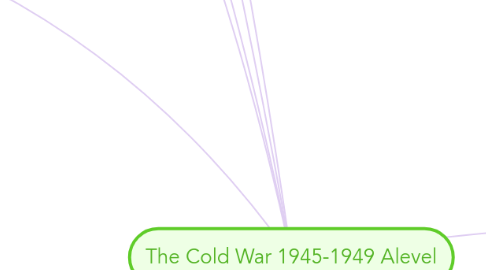
1. Tensions Before WW2 1917-1939 & 1941
1.1. 1917-1921
1.1.1. Russia becomes communist after 1917 revolution
1.1.2. The West tried to "strangle the communist regime at birth"
1.1.2.1. Conflicting idelogies
1.1.3. USSR owes money to the West
1.2. 1930s
1.2.1. Britain and France appease Hitler after 1933
1.2.1.1. Much to Stalin's dismay
1.2.2. Hitler's Foreign Policy from 1933-1938 was aimed against communist Russia
1.2.3. Stalin felt the West supported the policy because of the appeasement
1.2.3.1. West giving into Hitler's demands
1.3. 1939
1.3.1. Stalin signs Nazi-Soviet Pact with Hitler in August
1.3.1.1. West majorly suprised
1.3.2. West believed Hitler was demanding too much
1.4. 1941
1.4.1. WW2 forces USA and USSR together
1.4.1.1. Pearl harbour bombed by Japan
1.4.1.1.1. Nazi Operation Barbarossa - Germany attacked Russia
1.4.2. The 4 year Grand Alliance was set up to fight their common enemy - defeat Nazi Germany Fascism
1.4.2.1. USA
1.4.2.1.1. Britain
2. Effects of WW2 on USA
2.1. 300,000 men did not return
2.1.1. war loss was less than 2% of that inflicted on the USSR
2.2. less unemployment
2.2.1. economic increase
2.3. less keen on making Germany suffer
2.3.1. wanted to trade
2.3.2. wanted to rebuild Germany
2.4. producing 50% of the World's services and goods
3. Effects of WW2 on USSR
3.1. 27 million did not return
3.2. border to Moscow lay in ruins
3.3. 70,000 houses destroyed
3.4. attacked 3 times in early 20th century
3.5. 9/12 Soviet Republicans were occupied by the Germans
4. USSR actions in Germany
4.1. mass rapes of German women
4.2. Stalin ordered Berlin to feed USSR
4.3. abducted scientists and important individuals
4.4. Red Army wanted compensation and took what ever they wanted
5. 1945
5.1. January
5.1.1. most European states are liberated by soviet union
5.2. February
5.2.1. Yalta conference takes place
5.2.1.1. 4 -11 of February
5.3. April
5.3.1. Roosevelt had died
5.3.2. Hitler commits suicide
5.4. May
5.4.1. The War in Europe ends
5.5. July
5.6. July/August
5.7. August
5.8. September
6. Extending Soviet Sphere of Influence in Eastern Europe
6.1. Czechoslovakia
6.1.1. Czech communists were popular
6.1.2. Communist party leader became prime minister - Klement Gottwald
6.1.2.1. error was that he showed willingness to except western aid in 1947
6.1.3. pro Moscow communist were left in control after Edvard Benes resigned in 1948
6.2. Poland
6.2.1. pro Stalin lublin Government was established - was used by Stalin for political control
6.2.2. Stalin appeared to allow free election
6.2.3. 1947 the polish communist and socialist party merged - communist became the strongest group
6.2.4. Gomulka was replaced by Beirut who was more loyal to communist party
6.3. Hungary
6.3.1. communist used tactics of allying with other political group
6.3.2. opponents were arrested
6.3.2.1. Elections were manipulated and rigged
6.3.3. 1949 all opponents had been wiped out
6.3.4. The prime ministers son was kidnapped
6.4. Romania
6.4.1. communist were popular
6.4.2. red army occupied Romania
6.4.3. the king had abdicated in Dec 1947 after communists had eliminated opposition parties
6.5. Yugoslavia
6.5.1. initially were firmly embedded in the soviet camp
6.5.2. Josip Broz Tito was a committed Stalinist
6.5.3. There was conflict between Stalin and Tito 1948 Soviet influence was limited
6.5.4. yogoslavs refused to be soviet puppets
6.5.5. June 1948 they were expelled from comiform
6.5.6. able to survive due to US aid
6.6. Bulgaria
6.6.1. gradualism and manipulated elections
6.6.2. forced removal of oppenets
6.6.3. strongest opponent was Nikola Petkov was executed
6.6.4. 1947 all other political parties had been banned

